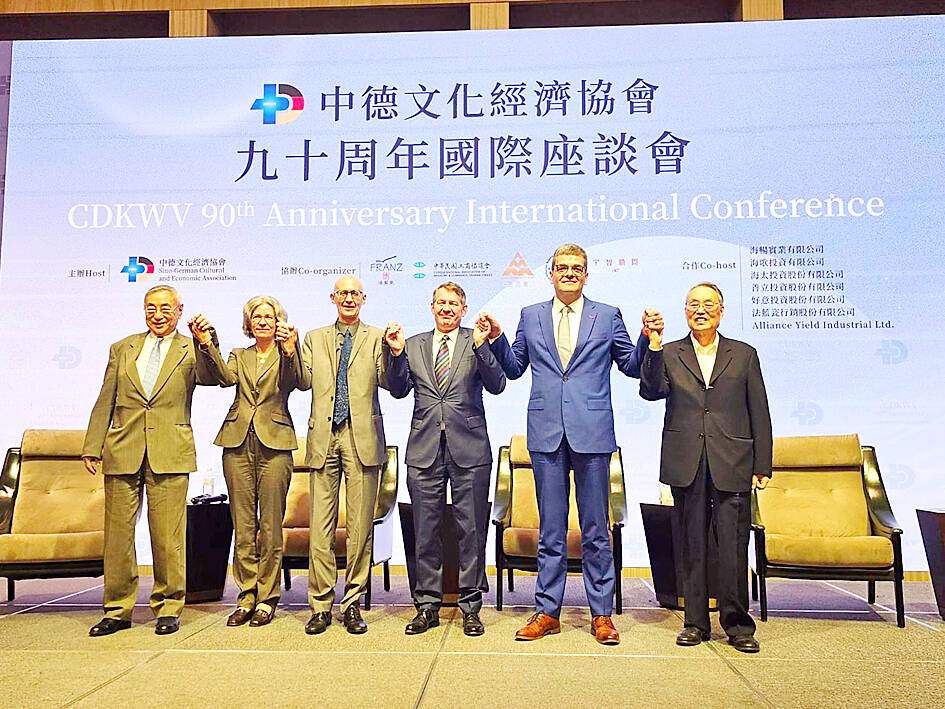German Institute Taipei Director-General Jorg Polster on Friday emphasized the importance of people-to-people exchanges, especially in education, that will come about from long-term bilateral collaboration after Taiwan’s top microchip maker, Taiwan Semiconductor Manufacturing Co (TSMC, 台積電), opens a chipmaking plant in Dresden, Germany.
At the Sino-German Cultural and Economic Association’s (CDKWV) 90th Anniversary International Conference, which held panel discussions on international supply chain development and opportunities for further Taiwan-Germany collaboration, Polster was invited along with other former German representatives and incumbent representatives from German-speaking countries to share their views.
The German representative said on a panel that while it is “these very broad structures, such as companies or Taiwan and Germany” that have been discussed, “in the end, it’s people [that matter].”

Photo: CNA
When talking about the investment by TSMC and what should be or will be done about the semiconductor industry, he said that “in the end, we need experts to handle these,” adding that industrial cooperation has to be coupled with academic cooperation.
“It was not by chance that the first federal minister [since 1997] to have visited Taiwan in March was a minister of education, training and science,” Polster said, referring to German Federal Minister of Education and Research Bettina Stark-Watzinger’s visit to Taiwan earlier this year, during which the two countries signed the first scientific and technological cooperation agreement.
The German representative said that based on this agreement, academic exchanges for young people would be further rolled out on the basis of existing ones.
“Starting next February, we will have 40 young students from Saxony to come to Taiwan, who will be studying at National Taiwan University for four months and then another two months at TSMC,” he said.
Polster said these people, along with around 2,600 Taiwanese students currently studying in Germany, are “ambassadors” who will bring Taiwan and Germany’s people and companies together.
During the panel, Polster said that while TSMC is in the spotlight right now, other companies, including supply chain firms, could find opportunities in different sectors in Germany.
He encouraged the Taiwanese companies to approach chambers of commerce and Taiwanese offices in Germany to seek more information.
Before the panel began, reporters asked Polster whether TSMC suppliers would have the German government’s support if they were to move to Germany as well, adding that TSMC’s Dresden factory is receiving 5 billion euros (US$5.29 billion) in subsidies.
Polster said that before looking to the government, in a market economy, assistance can first be sought through business associations, citing SEMI Taiwan in this case.
“I’m in discussion with [SEMI Taiwan president] Terry [Tsao (曹世綸)]. He will come with some representatives and I’ve been in contact with some people in Dresden, and we’ll bring them together to discuss what we need and what [opportunities] are available,” Polster said, stressing this is the “natural process” and his office is an “anchor for facilitating whatever needs to be facilitated.”
He told reporters that with a TSMC factory in Dresden, a supply chain from raw materials to technologies is already in place.
“There is a good reason why it’s called an ecosystem... We have this already with the Silicon Saxony, but it will be increased a lot,” Polster said, referring to an industry association of nearly 300 companies in the microelectronics and related sectors in the region.

The US dollar was trading at NT$29.7 at 10am today on the Taipei Foreign Exchange, as the New Taiwan dollar gained NT$1.364 from the previous close last week. The NT dollar continued to rise today, after surging 3.07 percent on Friday. After opening at NT$30.91, the NT dollar gained more than NT$1 in just 15 minutes, briefly passing the NT$30 mark. Before the US Department of the Treasury's semi-annual currency report came out, expectations that the NT dollar would keep rising were already building. The NT dollar on Friday closed at NT$31.064, up by NT$0.953 — a 3.07 percent single-day gain. Today,

‘SHORT TERM’: The local currency would likely remain strong in the near term, driven by anticipated US trade pressure, capital inflows and expectations of a US Fed rate cut The US dollar is expected to fall below NT$30 in the near term, as traders anticipate increased pressure from Washington for Taiwan to allow the New Taiwan dollar to appreciate, Cathay United Bank (國泰世華銀行) chief economist Lin Chi-chao (林啟超) said. Following a sharp drop in the greenback against the NT dollar on Friday, Lin told the Central News Agency that the local currency is likely to remain strong in the short term, driven in part by market psychology surrounding anticipated US policy pressure. On Friday, the US dollar fell NT$0.953, or 3.07 percent, closing at NT$31.064 — its lowest level since Jan.

The New Taiwan dollar and Taiwanese stocks surged on signs that trade tensions between the world’s top two economies might start easing and as US tech earnings boosted the outlook of the nation’s semiconductor exports. The NT dollar strengthened as much as 3.8 percent versus the US dollar to 30.815, the biggest intraday gain since January 2011, closing at NT$31.064. The benchmark TAIEX jumped 2.73 percent to outperform the region’s equity gauges. Outlook for global trade improved after China said it is assessing possible trade talks with the US, providing a boost for the nation’s currency and shares. As the NT dollar

The Financial Supervisory Commission (FSC) yesterday met with some of the nation’s largest insurance companies as a skyrocketing New Taiwan dollar piles pressure on their hundreds of billions of dollars in US bond investments. The commission has asked some life insurance firms, among the biggest Asian holders of US debt, to discuss how the rapidly strengthening NT dollar has impacted their operations, people familiar with the matter said. The meeting took place as the NT dollar jumped as much as 5 percent yesterday, its biggest intraday gain in more than three decades. The local currency surged as exporters rushed to